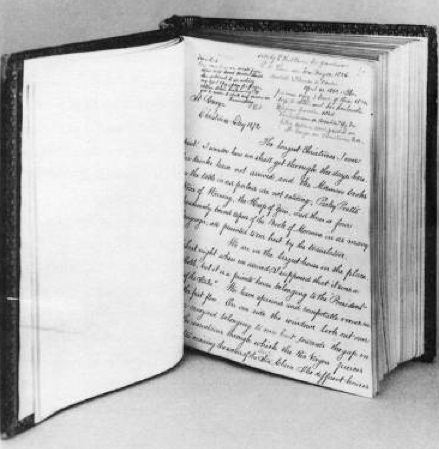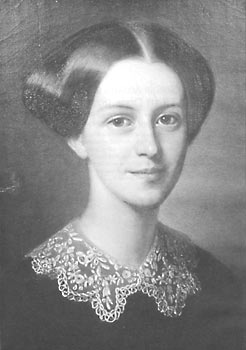Elizabeth Dennistoun Wood Kane
<<Elizabeth Dennistoun Wood Kane, 1836-1909
Her journal recorded her experiences during her family’s twelve-day trip from Salt Lake City to St. George, Utah, and as a guest of Brigham Young.
 A portion of Elizabeth Kane's Journal is as follows:
A portion of Elizabeth Kane's Journal is as follows:
“I have read in some Mormon book since I came here. Brigham Young said that the night Joseph found the plates “there was a wonderful light in the heavens. I was about 70 miles from there and stood for hours watching it. There were lances darting and the sound of cannon and armies just at hand, and flashes of light, though there were no clouds. Joseph’s discovery was in the papers directly, and everywhere people remarked the coincidence, because for hundreds of miles they had been out watching like myself.”
I asked where the plates were now, and saw in a moment from the expression of the countenances around that I had blundered. But I was answered that they were in a cave; that Oliver Cowdery though now an apostate would not deny that he had seen them. He had been to the cave, I did not understand exactly whether Oliver Cowdery was there three times, or whether he accompanied Joseph the third time he went there, and Brigham Young’s tome was so solemn that I listened bewildered like a child to the evening witch stories of its nurse. Nor do I understand whether the plates were all transcribed by this time or not. The plates are thin leaves of gold shaped like thin sections of a cowbell, to speak profanely, and threaded on golden rings, which the Mormons believe Joseph to have found in the hill in Cumorah. The curious characters inscribed upon them he was enabled to translate by means of magic, or hallowed, pair of immense eye-glasses, to speak profanely again of what the Mormons reverence, called the Urim & Thummim found in the same small chest in which the plates were. This translation is the Book of Mormon.
Brigham Young said that when Oliver Cowdery and Joseph Smith were in the cave this third time, they could see its contents more distinctly than before, just as your eyes get used to the light of a dim candle, and objects in the room become plain to you. It was about fifteen feet high and round its sides were ranged boxes of treasure. In the centre was a large stone table empty before, but now piled with similar gold plates, some of which also lay scattered on the floor beneath. Formerly the sword of Laban hung on the walls sheathed, but it was now unsheathed and lying across the plates on the table; and One that was with them said it was never to be sheathed until the reign of Righteousness upon the earth.”
I would have liked to hear more,…but Brigham Young ceased speaking and Bishop Snow related a long dream which had recently been vouchsafed to him. By this time my poor little boys were so tired after their long ride that they were nodding as they stood beside my chair. I whispered to them to go and sit down to rest, but Willie whispered back in a despairing way “Oh, I can’t bend, I’m so stiff!” So we prepared to take leave; the household as usual assembling first for prayers. The supplications for the continuance of the improvement in K’s health were very earnest. Afterwards, the wrappings were brought in and as we shawled ourselves Brigham Young noticed that K. wore thin dress shoes, and asked where his overshoes were. When he admitted that he did not intend wearing any, and could not be persuaded to borrow a pair, B.Y. quaintly remarked “For a man to neglect ordinary precautions regarding his health that he can perfectly well take himself, and then to ask the Lord to take care of him is an insult to the Lord’s common sense!” After that of course K. submitted, and when we left the house, we found that the ground was exceedingly damp.” [When Elizabeth Kane in the above Journal refers to “K” she is referring to her husband, Tomas L. Kane.]
(Elizabeth Dennistoun Wood Kane Journal, J. Willard Marriott Library, The University of Utah)
